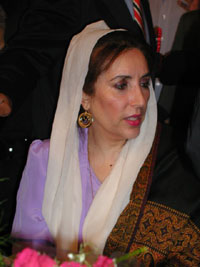Benazir Bhutto detained in her house by police
Benazir Bhutto’s house in Islamabad was surrounded by police armed forces. Pakistani opposition leader was detained there to prevent her planned rally against emergency rule.

Bhutto was not formally under house arrest, Information Minister Tariq Aziz said. But "we will not allow any leader to carry out any rally. The law is equal for everybody and anyone violating it will be dealt with accordingly," he told The Associated Press.
The move against Bhutto came amid a broader crackdown on her supporters, who were planning to rally later Friday near Islamabad against President Gen. Pervez Musharraf's emergency rule. Bhutto's party said some 5,000 of its supporters have been rounded up in the last three days, and riot police were out in force in nearby Rawalpindi , the city where the rally was to take place.
Outside Bhutto's home in an upscale Islamabad neighborhood, dozens of police, some in riot gear, had taken up positions, laying barbed wire and erecting concrete barriers.
"She's not going anywhere today," said an officer, who did not give his name.
Bhutto supporters decried the move. "It shows that the government is scared of Benazir Bhutto's popularity and it does not want her to be among masses," said Babar Awan, one of her close aides.
He added that the leadership of her Pakistan People's Party, the country's largest political party, would try to reach Rawalpindi for the protests.
That seemed unlikely: police had blocked the roads leading to the nearby city and were out in force there, patrolling on foot, horseback and motorcycle.
Bhutto, a former prime minister, had been in talks with Musharraf on a post-election political alliance. But she pulled back after the emergency was imposed, and her decision to join in anti-government protests was another blow for Musharraf, who has seen his popularity slide this year amid growing resentment of military rule and increasing violence by Islamic militants.
Critics argue that Musharraf, who seized power in a 1999 coup, suspended the constitution, blacked out dozens of TV news networks and ousted independent-minded judges to maintain his own grip on power. The moves came days before the Supreme Court was expected to rule on whether his recent re-election as president was legal.
Musharraf said the measures were needed to put an end to political instability and to fight Taliban and al-Qaida-linked militants.
Under U.S. pressure, he announced Thursday that elections would be held by mid-February.
But Bhutto dismissed the move, and pledged to go ahead with Friday's protest, despite a ban on public rallies and fears it could be targeted by suicide bombers.
It would have been her first rally since last month, when she returned to the country following eight years in exile to contest the parliamentary polls. That procession was shattered by suicide bombers, leaving more than 145 people dead. Islamic militants were widely blamed.
Subscribe to Pravda.Ru Telegram channel, Facebook, RSS!


